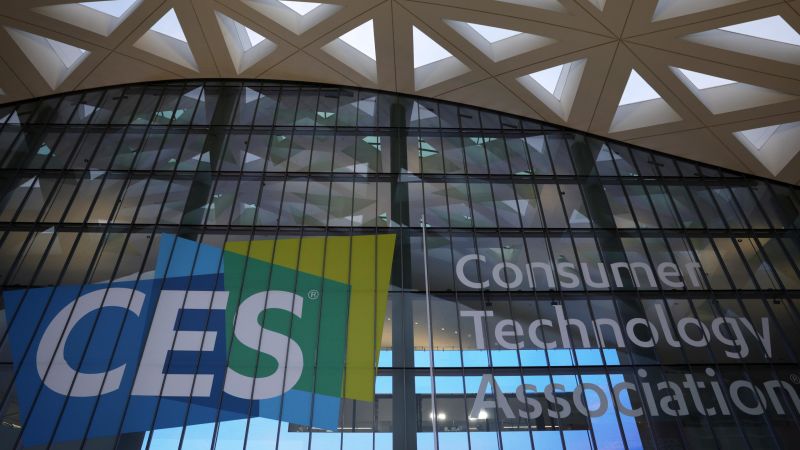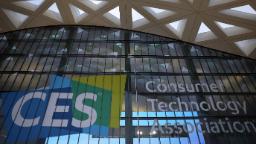

CNN
—
A new take on a foldable phone. A pricey toilet sensor that monitors hydration and vitamin levels. And an AI-powered oven.
The Consumer Electronics Show, now in its 56th year, kicks off this week in Las Vegas with a familiar mix of cutting edge technology and oddball gadgets. The event, which is the largest consumer tech conference of the year, is known for robots roaming the show floor; flashy presentations about next generation TVs; and quirky products such as last year’s buzzy health tracking light bulbs and dehumidifying earbuds.
But the event also fosters dealmaking among executives, manufacturers and retailers across various industries, and sets the stage for some of the biggest tech trends of the year. And this year’s event, in particular, could show how companies are thinking about products as pandemic concerns recede for some consumers but recession concerns remain.
The Consumer Technology Association, which hosts CES each year, said it is expecting about 100,000 in-person attendees this year, up significantly from the 45,000 people who attended in 2022 amid concerns of the Covid-19 Omnicron variant. (CTA is once again offering a livestream for attendees who’d rather watch the event remotely).
This year, featured speakers will include executives from traditional tech companies such as Samsung, Sony and Amazon, as well as other brands like John Deere, Delta and BMW. Although CES is traditionally a gadget show – and there will be no shortage of gizmos on display this year – about 60% of the Fortune 500 companies are participating this year, enabling more diverse product launches and discussions around all areas of tech.
“Despite a pretty tough economy, the companies we’re seeing [attending] are really strong,” Gary Shapiro, president of the CTA, which hosts the event, told CNN ahead of the event.
Some of the key themes at this year’s CES will include sustainability, artificial intelligence and foldable devices.
Among the products teased ahead of the 2023 CES is Samsung Display’s Flex Hybrid prototype, which features a foldable and slidable display (the right side slides to offer more screen space). Laptop maker Acer will show off a bicycle desk called eKinekt, allowing users to both work and pedal to generate kinetic energy that is used to help charge smartphones and laptops via the desk itself.
Health and wellness companies will once again dominate the show floors, even as pandemic concerns ease for some. Kohler already announced an aromatherapy shower system that attaches to shower heads and infuses the water stream with scents, such as lavender and eucalyptus, intended to help soothe the skin. Meanwhile, fitness wearables will be in heavy supply too.
Meanwhile, Withings $500 U-Scan device collects from your urine stream to detect vitamin deficiencies, check hydration and monitor metabolism (an additional device called the U-Scan Cycle Sync tracks periods and ovulation cycles).
Cars, trucks and boats will also get the spotlight this year. Stellantis will show off a concept version of its upcoming all-electric Ram pickup truck that will show where that brand is headed. Meanwhile, BMW will reveal an all-new user interface for its cars because, in today’s luxury car market, that matters to consumers at least as much as engine power and handling. Boating companies will also be showing off the latest in electric and autonomous watercraft tech as that market goes green, too.
“CES is getting away from being a Consumer Electronics Show and getting more and more into being a Consumer Experience Show,” said Ramon Llamas, a director at IDC Research. “We may see a new device pop up here and there, and it is easy to expect big televisions, cool cars, and gadgets galore. But the secret sauce is what the software can do.”
He believes artificial intelligence will particularly allow companies “to make sense of how a consumer behaves and set up the device experience to best serve those needs.”
But at least one hot topic from the prior year may be less of a focus now: the metaverse, or Meta’s idea of the metaverse.
In late 2021, Facebook ignited a wave of interest in the metaverse by changing its company name to Meta and announcing plans to invest heavily to continue developing virtual and augmented reality technologies that support more immersive online experiences.
Months later, at the 2022 Consumer Electronics Show, talk of the metaverse was everywhere. As Axios reported at the time, “many CES observers suggested a drinking game in which keynote watchers took a shot every time the metaverse was mentioned — but that would have been a recipe for alcohol poisoning.”
Now interest in the immersive virtual world appears to have simmered as Facebook has so far struggled to gain mainstream traction for its VR offerings.
Still, the topic of virtual reality products will remain a focus for some companies. HTC is expected to launch the Vive Focus 3 this week at the show, with an emphasis on the metaverse.
CES runs through Sunday, January 8.
– CNN’s Peter Valdes-Dapena contributed to this report
